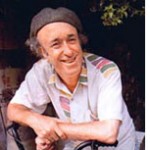By Danny Bloom

CHIAYI, Taiwan– I recently sat down on the internet— and in internet time — asked Los Angeles
writer Racelle Rosett a few questions by email about her published short stories on Jewish life. Among her published gems are “Moving Waters,” Levi” and “Shomer.”
(Our edited “conversation” follows below. Rosett is an award-winning short story writer, and an award-winning television writer in Hollywood, too. She received a Writers Guild of America award for her work on ”thirtysomething,” a popular TV drama.)
DANNY: You have enjoyed a successful career writing for television (”thirtysomething”, ”Blossom”, ”Facts of Life”, etc.) inHollywood. What wasyour trajectory in Hollywood in terms of how did you enter the
business at first, how did you sell your first TV script, and what did you study in college that prepared you for your career as a Hollywood writer? Are you still writing for TV?
RACELLE: I studied writing and acting at Emerson College in Boston and was part of the Emerson Comedy Workshop. I wrote and appeared in a small local television show. One of the sketches got some national exposure, and I was given a chance to write an episode of a sitcom. I moved out to L.A. and started my career.
DANNY: How did your Jewish values influence the work you took on and did in Hollywood and were there any times when you came up against a wall there, in terms of what you would allow yourself to do, and were there any special times where your Jewish background
played a big part if the work you did there?
RACELLE: My Jewish values and my own values are not really separable. so they informed all the work I did. I won the Writers Guild Award for a script for a ”thirtysomething” show that essentially boils down to a girl fighting with her Jewish mother about her expectations that she beboth successful at her career and a produce a grandchild. In my favorite ( but unproduced ) sitcom script that I wrote, a woman who isstaying with her mother after her divorce comes down to breakfast in her flannel nightgown to find her mother is laying in wait with a nice Jewish doctor she wants her to meet.
DANNY: Now you are writing and publishing short stories that are deeply involved with Reform Jewish life and issues. Can you discuss why you like the short story form, and is there a novel in you, too, just waiting to come out later?
RACELLE: I hope to be able to share news about future publication of the story collection soon on my website www.racellerosett.com. I am also working on a novel set in Israel in the 1970s about a group of young people who attended a school in the Negev as part of Ben Gurion’s vision to “make the desert bloom.” The story follows them for a year then and tracks them again 30 years later.
DANNY: Your short stories, among them, “Moving Waters.” What’s it about? Synopsis me!
RACELLE: ”Moving Waters” looks at the ancient ritual of ”mikvah” and the resonance it brings to a contemporary divorce.
DANNY: “The False Bride”…..
RACELLE: It’s a piece about the particular value of stories in shaping our understanding of loss as Jews.
DANNY: “Levi”….
RACELLE: The story of a child who is open and astute to the world we live in now and how this child is helped by prayer.
DANNY: “Shomer”
RACELLE: A story of a Jewish young man coming of age as he copes with loss.
DANNY: In your stories, you explore the usefulness of faith in a Reform Jewish community in Los Angeles. Define faith, define Jewishness, define Judaism. Tell me your view of God?
RACELLE: I think I can most effectively share my understanding of all those things you ask about in your questtion through the stories.
DANNY: What’s your favorite Jewish holiday, and why?
RACELLE: I lead a big Passover seder here in L.A. at a friend’s restaurant. I love the narrative of that journey, and, of course, the food. Really, I enjoy all of the holidays for the shape they give to the year. I’m also a huge fan of ”shabbat” and having people over and really feeling a sense of relief and rest and celebration at the end of the week on Friday night and Saturday.
DANNY: You are an American Jew, born and raised in the USA. What is your relationship to Israel, and how do you view the current and ongoing “situation” in the Middle East in terms of Israel’s place there — and how peace might eventually come, if ever.
RACELLE: I lived in Israel in 1975 and later worked in NYC for ”Rechov Sum Sum”, the Israeli ”Sesame Street” TV show. I have a deep connection to Israel. The work I’m doing now on my novel-in-progress is an exploration of that relationship.
*
Danny Bloom is a freelance writer in Taiwan. To purchase Racelle Rosett books through Amazon, click below: